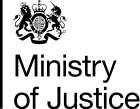Ministry of Justice (United Kingdom)
 | |
 Headquarters, 102 Petty France, London | |
| Ministerial Department overview | |
|---|---|
| Formed | 2007 |
| Preceding Ministerial Department | |
| Jurisdiction | United Kingdom, England and Wales in respect of certain devolved matters |
| Headquarters |
102 Petty France Westminster, London, SW1H 9AJ |
| Employees | over 77,000 |
| Annual budget | £8.2 billion & £400 million capital expenditure in 2011–12 [1] |
| Minister responsible | |
| Ministerial Department executive | |
| Child agencies | |
| Website | Official website |
| This article is part of the series: Courts of England and Wales |
| Law of England and Wales |
|---|
.svg.png) |
|
Criminal courts |
|
Criminal prosecution |
|
Legal profession |
The Ministry of Justice (MOJ) is a ministerial department of the British Government headed by the Secretary of State for Justice and Lord Chancellor (a combined position). The department is also responsible for areas of constitutional policy not transferred in 2010 to the Deputy Prime Minister, human rights law and information rights law across the UK.
The ministry was formed in May 2007 when some functions of the Home Secretary were combined with the Department for Constitutional Affairs.[2] The latter had replaced the Lord Chancellor's Department in 2003.
Its stated priorities are to reduce re-offending and protect the public, to provide access to justice, to increase confidence in the justice system, and uphold people’s civil liberties.[3] The Secretary of State is the minister responsible to Parliament for the judiciary, the court system and prisons and probation in England and Wales, with some additional UK-wide responsibilities e.g. the UK Supreme Court and judicial appointments by the Crown.
The Ministry of Justice of UK might oversee the administration of justice in Jersey, Guernsey and the Isle of Man [Crown dependencies], as well as Saint Helena, Ascension and Tristan da Cunha and the Falkland Islands [British Overseas Territories].[4][5][6] Gibraltar, another British overseas territory, has its own Ministry of Justice.[7]
Responsibilities
UK-wide
Prior to the formation of the Coalition Government in May 2010, the ministry handled relations between the British Government and the three devolved administrations: the Northern Ireland Executive; the Scottish Government; and the Welsh Government.
Responsibility for devolution was then transferred to the re-established position of Deputy Prime Minister, based in the Cabinet Office. He also assumed responsibility for political and constitutional reform, including reform of the House of Lords, the West Lothian Question, electoral policy, political party funding reform and royal succession.
The Deputy Prime Minister and Secretary of State for Justice have joint responsibility for a commission on a British bill of rights.[8]
The Ministry of Justice retained the following UK-wide remit:
- European Union and international justice policy
- Freedom of information and data protection
- Human rights and civil liberties
- The Supreme Court of the United Kingdom
- The National Archives
As the office of the Lord High Chancellor of Great Britain, the ministry is also responsible for policy relating to Lord Lieutenants (i.e. the personal representatives of the Queen), "non-delegated" royal, church and hereditary issues, and other constitutional issues, although the exact definition of these is unclear.[9]
The post of Lord Chancellor of Ireland was abolished in 1922 but Northern Ireland remains part of the UK, however the functions and responsibilities do belong from then to the Secretary of State for Northern Ireland, currently Karen Bradley[10].
England and Wales only
The vast majority of the Ministry of Justice's work takes place in England and Wales. The ministry has no responsibility for devolved criminal justice policy, courts, prisons or probation matters in either Scotland or Northern Ireland.
Within the jurisdiction of England and Wales, the Ministry of Justice is responsible for ensuring that all suspected offenders (including children and young people) are appropriately dealt with from the time they are arrested, until convicted offenders have completed their sentence.[11] The ministry is therefore responsible for all aspects of the criminal law, including the scope and content of criminal offences. Its responsibilities extend to the commissioning of prison services (through the National Offender Management Service), rehabilitation and reducing offending, victim support, the probation service and the out-of-court system, the Youth Justice Board, sentencing and parole policy, criminal injuries compensation and the Criminal Cases Review Commission.
Other responsibilities limited to England and Wales include the administration of all courts and tribunals, land registration, legal aid and the regulation of legal services, coroners and the investigation of deaths, administrative justice and public law, the maintenance of the judiciary, public guardianship and mental incapacity, supervision of restricted patients detained under the Mental Health Act 1983 and civil law and justice, including the family justice system and claims management regulation.
Crown dependencies
The Ministry of Justice is the department that facilitates communication between the Crown dependencies i.e. Jersey, Guernsey and the Isle of Man, and HM Government. These are self-governing possessions of the British monarch, through her titles as Duke of Normandy in the Channel Islands and Lord of Mann in the Isle of Man.
It processes legislation for Royal Assent passed by the insular legislative assemblies and consults with the Islands on extending British legislation to them. It also ensures that relevant British legislation is extended to the islands smoothly.[12]
Ministers
The Ministers in the Ministry of Justice are as follows:[13]
| Minister | Rank | Portfolio |
|---|---|---|
| The Rt Hon. David Gauke MP | Lord High Chancellor Secretary of State |
Secretary of State for Justice; the resourcing of the Department, overall strategy on criminal justice, penal policy and rehabilitation, Judicial policy, appointments and conduct, other functions of the Lord Chancellor and EU and international law. |
| Rory Stewart OBE MP | Minister of State | Prison operations, reform and industrial relations, probation services and reform industrial relations, sentencing (including out of court disposals), public protections (including Parole Board, IPPs and Serious Further Offences), foreign national offenders, extremism, electronic monitoring, and supporting the Secretary of State on departmental finances and transparency. |
| Lucy Frazer QC MP | Parliamentary Under-Secretary of State | Court services and reform (including bills), legal aid, legal support and fees, administrative justice and tribunals, criminal justice, family justice, supporting the Secretary of State on EU exit and international business, shadow Commons minister for Lord Keen's portfolio (except for the civil liabilities bill), Parliamentary minister for Statutory Instruments. |
| Edward Argar MP | Parliamentary Under-Secretary of State | Parliamentary Under Secretary of State for Youth Justice, Victims, Female Offenders and Offender Health; victims and witnesses policy (including sponsorship of the Criminal Cases Review Commission and CICA), chair of the Victims Panel, miscarriages of justice, offender health and mental health, mental capacity including sponsorship of the, Office of the Public Guardian, substance misuse, Taylor Review of youth justice, youth custodial estate, Youth Justice Board, youth sentencing, female offenders, coroners, burials, cremation and inquiries policy, family law, family justice and, mediation, including Cafcass, veterans, restorative justice, devolution deals, devolved administrations, Lammy Review of race in the criminal justice system, sponsorship of the Official Solicitor. |
| The Rt Hon. Lord Keen of Elie QC | Ministry of Justice spokesperson for the Lords Advocate General for Scotland |
Departmental business in the Lords, and advising the Secretary of State on civil justice (including discount rate and whiplash), legal services, Global Britain, relationship with the legal profession, claims management regulation and the Crown dependencies. |
The Permanent Secretary at the Ministry of Justice is Richard Heaton, who is by virtue of his office working for the Lord Chancellor, also Clerk of the Crown in Chancery.
See also
References
- ↑ Budget 2011 (PDF). London: HM Treasury. 2011. p. 48. Archived from the original (PDF) on 1 August 2011. Retrieved 30 December 2011.
- ↑ National Audit Office (6 July 2010). Ministry of Justice, Financial Management Report (PDF). TSO. p. 10. ISBN 978-0-10-296533-9.
- ↑ List of Ministerial Responsibilities. London: Cabinet Office. 2010. p. 44.
- ↑ "Crown Dependencies: Jersey, Guernsey and the Isle of Man". GOV.UK. Retrieved 2018-07-17.
- ↑ "The Overseas Territories: Security, Success and Sustainability" (PDF). Foreign & Commonwealth Office. June 2012.
- ↑ "Chief Justice of the Falkland Islands | Judicial Appointments Commission". www.judicialappointments.gov.uk. Retrieved 2018-07-17.
- ↑ "Departments & services | Government of Gibraltar". www.gibraltar.gov.gi. Retrieved 2018-07-17.
- ↑ "Cabinet Office". List of Government departments and ministers. Cabinet Office. Retrieved 22 May 2012.
- ↑ "Ministry of Justice". List of Government departments and ministers. Cabinet Office. Retrieved 22 May 2012.
- ↑ "Secretary of State for Northern Ireland - GOV.UK". www.gov.uk. Retrieved 2018-04-29.
- ↑ "Home Office to be split in two". BBC News Online. BBC. 29 March 2007. Retrieved 29 March 2007.
- ↑ "Ministry of Justice – What we do – Crown dependencies". Retrieved 7 April 2013.
- ↑ "Full list of new ministerial and government appointments: July 2016". GOV.UK. Prime Minister's Office, 10 Downing Street. 18 July 2016. Retrieved 19 July 2016.
External links
- Official website
- Ministry of Justice resources for legal professionals
- Ministry of Justice organogram from data.gov.uk